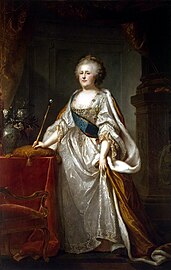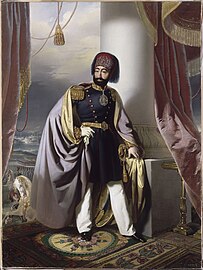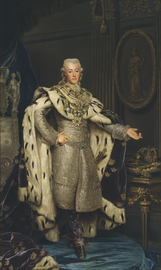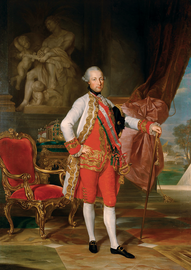
The Age of Enlightenment or the Enlightenment, also known as the Age of Reason, was an intellectual and philosophical movement that occurred in Europe, especially Western Europe, in the 17th and 18th centuries, with global influences and effects. The Enlightenment included a range of ideas centered on the value of human happiness, the pursuit of knowledge obtained by means of reason and the evidence of the senses, and ideals such as natural law, liberty, progress, toleration, fraternity, constitutional government, and separation of church and state.

Catherine II, most commonly known as Catherine the Great, was the reigning empress of Russia from 1762 to 1796. She came to power after overthrowing her husband, Peter III. Under her long reign, inspired by the ideas of the Enlightenment, Russia experienced a renaissance of culture and sciences, which led to the founding of many new cities, universities, and theatres, along with large-scale immigration from the rest of Europe and the recognition of Russia as one of the great powers of Europe.

Maria Theresa was ruler of the Habsburg dominions from 1740 until her death in 1780, and the only woman to hold the position suo jure. She was the sovereign of Austria, Hungary, Croatia, Bohemia, Transylvania, Mantua, Milan, Galicia and Lodomeria, the Austrian Netherlands, and Parma. By marriage, she was Duchess of Lorraine, Grand Duchess of Tuscany, and Holy Roman Empress.
Absolute monarchy is a form of monarchy in which the monarch rules in his or her own right or power. In an absolute monarchy, the king or queen is by no means limited and has absolute power. Often such monarchies are hereditary.

Joseph II was Holy Roman Emperor from 18 August 1765 and sole ruler of the Habsburg monarchy from 29 November 1780 until his death. He was the eldest son of Empress Maria Theresa and her husband, Emperor Francis I, and the brother of Marie Antoinette, Leopold II, Maria Carolina of Austria and Maria Amalia, Duchess of Parma. He was thus the first ruler in the Austrian dominions of the union of the Houses of Habsburg and Lorraine, styled Habsburg-Lorraine.

Leopold II was Holy Roman Emperor, King of Hungary, Croatia and Bohemia, and Archduke of Austria from 1790 to 1792, and Grand Duke of Tuscany from 1765 to 1790. He was a son of Empress Maria Theresa and Emperor Francis I, and the brother of Queen Marie Antoinette of France, Queen Maria Carolina of Naples, Duchess Maria Amalia of Parma, and Emperor Joseph II. Leopold was a moderate proponent of enlightened absolutism. He granted the Academy of Georgofili his protection. Unusually for his time, he opposed the death penalty and torture and abolished it in Tuscany on 30 November 1786 during his rule there, making it the first nation in modern history to do so. This act has been commemorated since 2000 by a regional custom known as the Feast of Tuscany, held every 30 November. Despite his brief reign, he is highly regarded. The historian Paul W. Schroeder called him "one of the most shrewd and sensible monarchs ever to wear a crown".
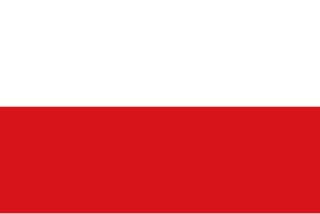
The Czech lands, then also known as Lands of the Bohemian Crown, were largely subject to the Habsburgs from the end of the Thirty Years' War in 1648 until the Austro-Hungarian Compromise of 1867. There were invasions by the Turks early in the period, and by the Prussians in the next century. The Habsburgs consolidated their rule and under Maria Theresa (1740–1780) adopted enlightened absolutism, with distinct institutions of the Bohemian Kingdom absorbed into centralized structures. After the Napoleonic Wars and the establishment of the Austrian Empire, a Czech National Revival began as a scholarly trend among educated Czechs, led by figures such as František Palacký. Czech nationalism took a more politically active form during the 1848 revolution, and began to come into conflict not only with the Habsburgs but with emerging German nationalism.
The ideas of the Age of Enlightenment came to Spain in the 18th century with the new Bourbon dynasty, following the death of the last Habsburg monarch, Charles II, in 1700. The period of reform and 'enlightened despotism' under the eighteenth-century Bourbons focused on centralizing and modernizing the Spanish government, and improvement of infrastructure, beginning with the rule of King Charles III and the work of his minister, José Moñino, count of Floridablanca. In the political and economic sphere, the crown implemented a series of changes, collectively known as the Bourbon reforms, which were aimed at making the overseas empire more prosperous to the benefit of Spain.

The United Belgian States, also known as the United States of Belgium, was a short-lived confederal republic in the Southern Netherlands established after the Brabant Revolution. It existed from January to December 1790 as part of the unsuccessful revolt against the Habsburg Emperor, Joseph II.

From the House of Braganza restoration in 1640 until the end of the reign of the Marquis of Pombal in 1777, the Kingdom of Portugal was in a transition period. Having been near its height at the start of the Iberian Union, the Portuguese Empire continued to enjoy the widespread influence in the world during this period that had characterized the period of the Discoveries. By the end of this period, however, the fortunes of Portugal and its empire had declined, culminating with the Távora affair, the catastrophic 1755 Lisbon earthquake, and the accession of Maria I, the first ruling Queen of Portugal.

Josephinism is a name given collectively to the domestic policies of Joseph II, Holy Roman Emperor (1765–1790). During the ten years in which Joseph was the sole ruler of the Habsburg monarchy (1780–1790), he attempted to legislate a series of drastic reforms to remodel Austria in the form of what liberals saw as an ideal Enlightened state. This provoked severe resistance from powerful forces within and outside his empire, but ensured that he would be remembered as an "enlightened ruler" by historians from then to the present day.
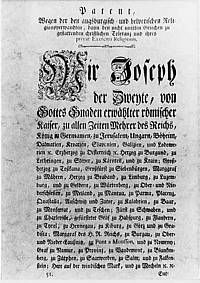
The 1782 Edict of Tolerance was a religious reform of Emperor Joseph II during the time he was emperor of the Habsburg monarchy as part of his policy of Josephinism, a series of drastic reforms to remodel Austria in the form of the ideal Enlightened state. Joseph II's enlightened despotism included the Patent of Toleration, enacted in 1781, and the Edict of Tolerance in 1782. The Patent of Toleration granted religious freedom to the Lutherans, Calvinists, and Serbian Orthodox, but it was not until the 1782 Edict of Tolerance that Joseph II extended religious freedom to the Jewish population.

The Russian Age of Enlightenment was a period in the 18th century in which the government began to actively encourage the proliferation of arts and sciences, which had a profound impact on Russian culture. During this time, the first Russian university was founded, a library, a theatre, a public museum, as well as relatively independent press. Like other enlightened despots, Catherine the Great played a key role in fostering the arts, sciences, and education. The national Enlightenment in the Russian Empire differed from its Western European counterpart in that it promoted further modernization of all aspects of Russian life and was concerned with abolishing the institution of serfdom in Russia. Russian Enlightenment didn't promote any changes for separation of church and state. Pugachev's Rebellion and the French Revolution may have shattered the illusions of rapid political change, but the intellectual climate in Russia was altered irrevocably. Russia's place in the world was debated by Denis Fonvizin, Mikhail Shcherbatov, Andrey Bolotov, Alexander Radishchev, and Ivan Boltin; these discussions precipitated the divide between the radical, western, conservative and Slavophile traditions of Russian thought. Intellectuals often used the term prosveshchenie, promoting piety, erudition, and commitment to the spread of learning.
The Serfdom Patent of 1 November 1781 aimed to abolish aspects of the traditional serfdom system of the Habsburg monarchy through the establishment of basic civil liberties for the serfs.

The Brabant Revolution or Brabantine Revolution, sometimes referred to as the Belgian Revolution of 1789–1790 in older writing, was an armed insurrection that occurred in the Austrian Netherlands between October 1789 and December 1790. The revolution, which occurred at the same time as revolutions in France and Liège, led to the brief overthrow of Habsburg rule and the proclamation of a short-lived polity, the United Belgian States.

Absolutism or the Age of Absolutism is a historiographical term used to describe a form of monarchical power that is unrestrained by all other institutions, such as churches, legislatures, or social elites. The term 'absolutism' is typically used in conjunction with some European monarchs during the transition from feudalism to capitalism, and monarchs described as absolute can especially be found in the 16th century through the 19th century. Absolutism is characterized by the ending of feudal partitioning, consolidation of power with the monarch, rise of state power, unification of the state laws, and a decrease in the influence of the church and the nobility.

From the 1680s to 1789, Germany comprised many small territories which were parts of the Holy Roman Empire of the German Nation. Prussia finally emerged as dominant. Meanwhile, the states developed a classical culture that found its greatest expression in the Enlightenment, with world class leaders such as philosophers Leibniz and Kant, writers such as Goethe and Schiller, and musicians Bach and Beethoven.
Tsarist autocracy, also called Tsarism, was a autocracy, a form of absolute monarchy localised with the Grand Duchy of Moscow and its successor states the Tsardom of Russia and the Russian Empire. In it, the Tsar possessed in principle authority and wealth, with more power than constitutional monarchs counterbalanced by legislative authority, as well as a more religious authority than Western monarchs. The institution originated during the time of Ivan III (1462−1505) and was abolished after the Russian Revolution of 1917.

Ignác Martinovics was a Hungarian scholar, chemist, philosopher, writer, secret agent, Freemason and a leader of the Hungarian Jacobin movement. He was condemned to death for high treason and beheaded on 20 May 1795, along with count Jakab Sigray, Ferenc Szentmarjay, József Hajnóczy and others. As the founder of the Hungarian Jacobin Clubs, he was considered an idealistic forerunner of great thought by some, and an unscrupulous adventurer by others.
In political science, despotism is a form of government in which a single entity rules with absolute power. Normally, that entity is an individual, the despot, but societies which limit respect and power to specific groups have also been called despotic.


